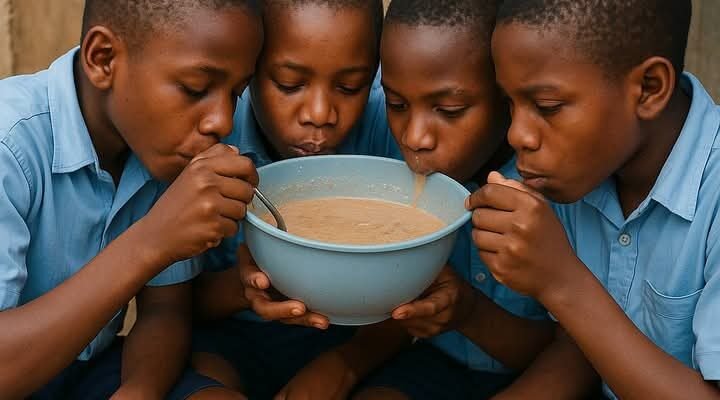The school taught me more about life than any textbook ever could. If you’ve never lived in the hostel, you might think school ends after last bell. But for us boarders? That’s when the real school began.
From the first week, I learned fast, from Erokosima where I pitched for a while to my beautiful Owerri House, newly renovated and occupied by mostly juniors: in the hostel, we weren’t just classmates— we were brothers. We washed each other’s plates, shared food, fought together, defended each other, and cried together. And believe me, that bond ran deep.
Omo…!
In fact, if a day student ever made the mistake of fighting a boarder, the whole hostel would rise. It wasn’t even something you planned. One slap from a day student, and five boys would appear like magic. We didn’t care if you were JSS3 or SS2—if you touch one of us, you touch all of us. That was the rule.
But even in that brotherhood, there was one thing you never wanted to be: an Akpo.
You see, conjo was our sacred tradition. We didn’t have kitchens of our own—just a general school kitchen where food was prepared by the cooks Nma kitchen and De Gold; then served in the refectory. But our lifeline, our joy after a long day, was conjo: a mixture of garri, Milo, milk, sugar, and whatever else your pocket could afford. Conjo wasn’t just about eating—it was about connecting. You’d see boys huddled in groups around bunks, trading ingredients and laughter. Oya…You go drop sugar, I go drop Milo. Another boy go offer milk. In less than five minutes, we’re all smiling with bowls in hand.
Then came Ugochukwu.
New boy. JSS1. His locker was stacked like a mini-mart—sardines, biscuits, rolls of Milo, Peak milk, even those expensive glucose crackers. We welcomed him warmly, called him “newbie”, helped him arrange his locker, and even shared our own things with him. But when it came time to ask for small sugar or a teaspoon of milk, he would clutch his box key like it was gold and say, “I don’t want it to finish.”
At first, we laughed. Maybe he was shy. By the second week, we knew—it wasn’t shyness. It was stinginess. Classic Akpo. From that day, he was called Akpo the Second. And as per hostel tradition, an Akpo gets no love. No one shared with him, no one called him for gist, and when his bucket went missing, no one even blinked.
But karma, e get leg. You no go chop our own come de give us akpo for your own.. en no make..
One rainy Thursday, after evening prep, the refectory gave an announcement that changed everything: “No night food. Rain disturbed cooking.” Omo…me way don wash prepare my plate finish to go chop beta food…. Chim… .Hunger fell upon the hostel like a thief in the night. Everyone scrambled to their provisions. Even boys with only garri and stone sugar managed something.
But Ugochukwu?
His box had been broken into the day before—whether by thief or punishment from the hostel gods, we’ll never know. His once-mighty locker was now empty. Gone. Everything. Omina…. If them knack you omina, u go understand say no be comfort zone you de, dem fit omina anything even cloth way u just wash, name it, cup, bucket oh, provisions oh…
That evening, we watched him walk from bunk to bunk like a lost sheep. His lips were dry, and his eyes red. He stared longingly as boys stirred conjo on their bunks, the smell of Milo and milk floating like perfume in the air. He even begged one junior boy, who had nothing but dry garri and tears, but the boy turned away. That’s when we knew: hunger don hold am.
Around 9pm, by then Aguru don finish am, Ugochukwu couldn’t take it anymore. He stood in the center of the room—barefoot, eyes full of regret—and said the most humbling thing a boy could say in hostel life:
“Please, I’m sorry. I was wrong. I didn’t know how things worked. I don’t want to be Akpo again. Please… help me.”
There was silence. Then one of the older boys shouted, “You go wash everybody plate!” The room exploded in laughter.
But that’s the thing about brotherhood. We tease, we roast, but when one of us is truly down, we lift him. That night, we each dropped something for Ugochukwu. I gave him half Milo, another gave sugar, someone else offered milk. Even the senior who had never smiled gave him a spoon. That was the night he ate the best conjo of his life—not because it was sweet, but because it was shared.
From that day, Ugochukwu changed. He became one of us—he laughed, he shared, he listened. Never again did he lock his locker like a central bank vault.
So if you’re reading this and thinking of being stingy in the hostel, remember this: Provisions will finish. But brotherhood remains. And in G.S.S. Owerri, especially in Owerri House, your real treasure isn’t what you keep—it’s what you give.
And please, don’t ever raise your hand on a boarder. Unless you’re ready for war.
Emerenwa John-Vianney
Owerri House, Class of 2006
![]()






